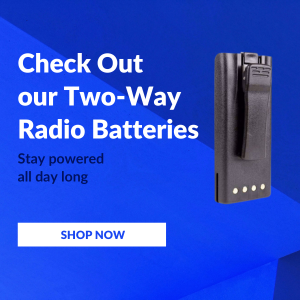With consistent upheaval and obstacles, communication is paramount on fishing boats. Durable communication technology is necessary to attain clear and consistent connections while on a boat or at the docks.
Fishing boats and dock operations can run a clean and safe business with the proper technology and accessories. Learn about how two-way radios and paired accessories can improve your fishing operation.
Four Reasons to Use a Two-Way Radio:
Instant Communication:
Two-way radios can provide instant communication, which is extremely helpful for running a business and managing dangerous situations. Radios can aid in the proper management of employees by providing clear instructions and answering questions right away.
Moreover, radios are extremely useful for emergencies. When on the water, weather conditions change rapidly, one minute it can be a beautiful sunny day, and the next minute it’s a blustering storm. Two-way radios between crew members can help notify the entire crew of a storm on the horizon in real time. This instant communication will help the crew work efficiently to prepare the boat for rough conditions.
Lastly, almost every boat is already equipped with a radio system, so boats can get in touch with rescue organizations, hear weather forecasts, and communicate with fellow boats. However, what if that radio fails? Two-way radios will still be able to call emergency services and are equipped to send out SOS signals. Overall, two-way radios provide instant and reliable communication that other technology just can’t give.
Range of Connection:
Connection range is very important when on a boat because it can unpredictable. There are two main frequency bands to choose between when looking at two-way radios—UHF or ultra-high frequency and VHF or very-high frequency. UHF has shorter frequency waves which allow it to penetrate close-distance obstacles like walls.
VHF operates on the low band which uses frequency waves that do not bend meaning the frequencies are easily interrupted by buildings and mountains. Therefore, VHF radios and antennas are the best option for those working on the open water. VHF also tends to be less expensive compared to UHF and VHF uses less battery power.
When looking for an antenna for your radio make sure it matches the frequency band your radio operates within. If you are purchasing a VHF-compatible radio, make sure your radio antenna is also VHF compatible.
Durability:
Two-way radios are designed and engineered for rough conditions. They are made to IP67 standards and MIL standards which means they can withstand a variety of conditions. For instance, many two-way radios are waterproof and shock-resistant. Both of these elements apply to the dangers on a fishing boat or the docks.
These radios are also built to withstand quick changes in the environment like temperature. Shock to an electronic system can happen with extreme temperatures—think about an Iphone overheating in the sun and shutting down. Two-way radios are designed to function to the fullest ability even in those extreme temperatures, unlike other communications technology.
Battery life:
Just like two-way radios being manufactured for longevity, so are the batteries that power the long hours. Two-way radio batteries are made to last for long working days. Most days on a fishing boat are longer than the average 8 hour workday. Therefore, radio batteries are made to last for 10 hours at a time.
In addition to long working hours, two-way batteries can be conditioned. Battery conditioners help train the battery to hold the long charge. If a radio is consistently put on a charger when it still has a half charge, the battery will learn to only hold that 50%. Conditioners retrain the battery to work and use the whole 100%.
Lastly, radio batteries are made to be extremely durable, like any radio accessory. Most two-way batteries are IP67-rated. Like the radios, the batteries can withstand sharp falls, water submersion, and temperature shocks. All of these features of two-way radio batteries prove how useful they would be on a boat.
Important things to note:
Two important things to remember if you decide two-way radios and accessories will be helpful for your crew; We suggest an hour or two of training for how to use the radios, specifically in emergencies, and to designate channels to specific needs.
With these two tasks accomplished, you should get the most out of your radios. Additional equipment that can be useful includes belt clips and radio cases to protect your investment, earpieces, and speaker mics.
Noise while on the water (from the boat engines, various fishing supplies, and potential storms/or the water) can prevent you from properly hearing transmissions. Earpieces and communication headsets can help radio users hear transmissions completely so communication remains consistent. Moreover, this hearing technology is designed to let in safe levels of noise. For instance, if there is a conversation occurring nearby the user can hear it, but dangerous decibels from the engine will be minimized.
PTT or speaker mics can be useful for hands-free communication. Working on a fishing boat requires constant vigilance and “all hands on deck”. However, continuing to communicate is important; therefore, technology like speaker mics was adapted so workers could hear and send transmissions hands-free.
Conclusion:
With unpredictable conditions, loud machinery, and distance, communication on fishing boats and docks alike can be challenging. Technology like two-way radios and paired accessories combat those challenges to make communication reliable and seamless.
By implementing two-way radios, speaker mics, and belt clips into your fishing crew, you are creating a safer and more efficient workplace.
For more information about what accessories such as chargers/conditioners, earpieces, headsets, and speaker mics will work best for your situation, feel free to reach out to our communication specialists at Waveband.


